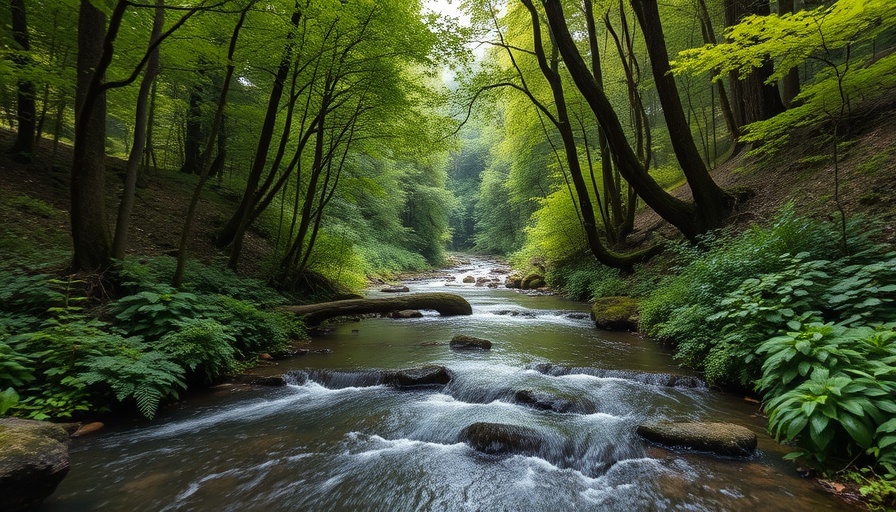
Finding Resilience in Nature's Lessons
Nature offers a profound repository of wisdom, teaching us lessons that can significantly benefit our mental health and emotional well-being. For sufferers of anxiety disorders, depression, and various life stresses, looking to nature can illuminate paths toward recovery and resilience. The integration of natural environments into our daily lives serves as a powerful antidote to anxiety, offering solace amidst chaos.
Understanding Anxiety and Its Symptoms
Anxiety disorders manifest in various forms, including generalized anxiety disorder, social anxiety, and numerous phobias. Symptoms can range from overwhelming panic attacks to the more subtle anxiety that creeps in during stressful situations. Recognizing these symptoms is crucial for individuals, especially youth and students navigating pressures from school and social expectations.
The Role of Mindfulness and Nature Therapy
Mindfulness, when combined with nature therapy, creates a unique healing modality. Individuals can benefit from mindful walks in parks or natural settings, where the sights and sounds of nature encourage relaxation and help alleviate anxiety symptoms. Simple breathing exercises in these serene settings can ground us, promoting a sense of peace that counters feelings of stress.
Connecting with Nature: Community and Personal Healing
For families and caregivers of those suffering from mental health challenges, connecting with nature offers communal healing opportunities. Group walks, nature-based activities, or even gardening can serve as supportive experiences for those battling conditions such as PTSD and anxiety. Engaging with others in the healing process fosters a sense of belonging, allowing people to open up about their struggles while bonding over shared experiences.
The Economic Burden: A Case for Mental Health Awareness
Coping with mental health issues can also come with economic stress. Understanding that mental health impacts workplace productivity and broader economic conditions underscores the importance of developing public awareness campaigns. Issues such as unemployment anxiety and the impact of the COVID-19 pandemic highlight the intersection of mental health and economic instability, emphasizing the need for mental health policy reform that includes community outreach and education.
Practical Insights: Breathing Exercises and Self-Care
Incorporating relaxation techniques like deep breathing exercises can be instrumental for those facing anxiety. Here’s a simple technique: find a quiet space in nature, close your eyes, and take deep breaths. Inhale through your nose for a count of four, hold for four seconds, and exhale through your mouth for a count of six. Practicing these techniques regularly can help manage symptoms of anxiety and contribute to overall stress management.
Cognitive Behavioral Therapy and Nature: A Holistic Approach
A holistic approach that combines cognitive behavioral therapy with consistent exposure to nature can enhance treatment outcomes. Such therapies encourage positive thought patterns while grounding individuals in nature’s tranquility. Recognizing the relationship between mental health and environmental interactions can foster a richer understanding of recovery as a journey influenced by both personal agency and environmental support.
The Future of Mental Health Awareness and Nature
The connection between nature and mental health is increasingly recognized in therapeutic environments, and we can expect to see a rise in programs aimed at integrating these elements into treatment plans. Schools are beginning to adopt outdoor learning experiences, which not only support student mental health but also educate families about the importance of nature therapy.
How to Get Involved: Community Outreach Initiatives
Involvement in community-driven mental health initiatives can play a significant role in reducing stigma while promoting awareness around mental health issues. Consider volunteering with local organizations advocating for mental health awareness, collaborating on events that promote outdoor activities, or participating in support groups to create a network of understanding and resilience.
As we reflect on the healing power of nature, individuals and communities can utilize these insights to foster resilience and recovery. Explore the serenity that nature offers, and seek to incorporate its lessons into daily life for a more balanced and fulfilling existence. A simple stroll outside may provide not just a break from daily stressors but also align you with a larger, healing community.
 Add Row
Add Row  Add
Add 




Write A Comment